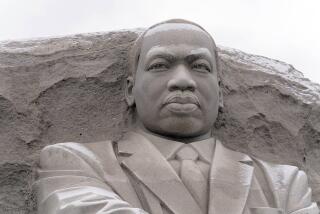Nearly 500 March as Part of King Day Celebration
- Share via
OXNARD — Cameron Ulery and his 8-year-old daughter, Olivia, celebrated the Martin Luther King Jr. holiday Monday a little differently from most of the folks around them: They set up a play date.
And of all the ways to honor the anniversary of slain civil rights leader’s birth, King probably would be just fine with that.
The Ulerys and other families who planned to gather so their children could play together were both white and African American.
It looked as if King’s dream of racial equality was being fulfilled right there on the rainy patio of the Oxnard Performing Arts Center.
The Ulerys were among nearly 500 people who marched about a mile from downtown Oxnard to the center as part of a celebration marking the holiday.
He said he attends the event, now in its 14th year, each January.
“I have a deep appreciation for what Martin Luther King did,” Ulery said. He pointed vigorously to his daughter and added, “I think we’ve got to teach them that starting younger and younger.”
Ulery said his passion for King’s legacy dates to his childhood, when his parents took him to Memphis to participate in a King march. It was there that he met King, he said.
“Too bad I didn’t get to go,” said Olivia, beaming in a bright purple rain slicker.
“Well, you weren’t even around yet!” her father said with a laugh.
Community members and spiritual leaders throughout the day echoed that respect for King’s sacrifice and the hope for racial unification.
Ventura English teacher Ron Hertz perched his son, B.J., on his shoulders while holding a sign that read, “Tell us who really killed MLK” on one side and, “End War Racism and Poverty” on the other.
Hertz, who has attended the Oxnard march for nearly a decade, said that King’s vision is often summed up in the civil rights leader’s “I have a dream” speech, but that his legacy amounts to more than that.
“Some of these other battles have yet to be won,” he said, citing such national problems as addiction, hunger and illiteracy.
Hertz and others, mostly African Americans, but also whites, Asians and Latinos, sang “We Shall Overcome” as they walked nearly a mile through the rain.
Oxnard history teacher Bill Thrasher paused to talk about persistent racial issues.
He spoke of ending “racial profiling” by police and others. And he wondered if financial reparations to African American families wronged by institutionalized racism were warranted--not, he said, for the sake of money, but to “make sure that injustice becomes justice.”
*
It’s hard to say what King would have said about that issue, he said.
One 14-year-old said he attended the event to fulfill court-mandated community service hours. Asked what he thought of the march, he said, “I have no idea,” then paused and delivered a textbook answer: “It’s a good thing. [Martin Luther King Jr.] helped free the blacks.”
When the march ended at the Performing Arts Center, a crowd of about 800 gathered for a service that celebrated both the deep spiritual faith of the civil rights movement and the community it fosters.
Elected officials and religious leaders introduced several people in the audience, including scores of children, ministers and political activists.
One of those honored was 12-year-old Dan Laguatan, who read a speech that won him a contest sponsored by the international Alpha Kappa Alpha black sorority. Barely peeking over the podium, he was a small body with a powerful spirit. His voice boomed, rising and falling as he described King as a “destroyer of racism.”
“We honor Martin Luther King every day by meeting people of a different race with a smile and a handshake,” he said.
*
A children’s choir sang several hymns and the whole group sang “God Bless America” and, once again, “We Shall Overcome.”
In the keynote speech, local poet and orator Daisy Davis-Cotton blasted a note of dignified passion over the gathering as she spoke of King’s sacrifice and the sense of community she hoped it would continue to spawn.
As her speech reached high notes in cadence and rhythm, audience members shouted, “All right!” and “Go Daisy!”
“I wish I could reach out and hug each one of you this morning,” she said, “not just Afro-Americans . . . We love you and we care about you. If you are ever in need, call us.”
More to Read
Sign up for Essential California
The most important California stories and recommendations in your inbox every morning.
You may occasionally receive promotional content from the Los Angeles Times.













